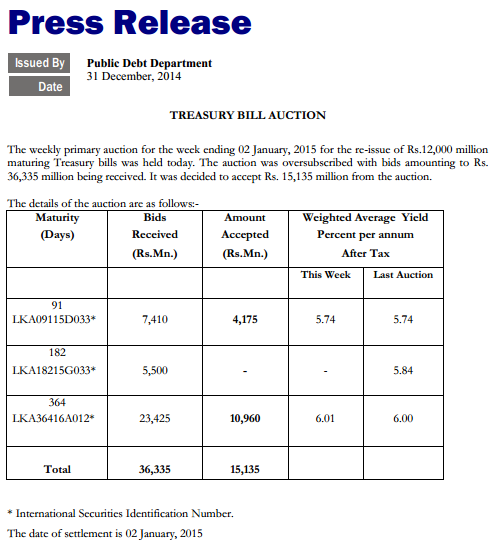By Ravi Ladduwahetty
Ceylon Finance Today: The Colombo Stock Exchange is expected to perform even better in 2015 than it did in 2014 based on the prevailing low inflation and low interest regime, a frontline stock broker said.
"The Colombo bourse performed well till the announcement of the 8 January Presidential elections where the All Share Price Index was up 29% based on the low interest and low inflation regime, which by itself was good," Chairman of the Colombo Stock Brokers' Association, Dihan Dedigama told Ceylon FT yesterday.
Dedigama, who is also CEO of Softlogic Stockbrokers (Pvt) Ltd, said that the market sought a correction with the announcement of the Presidential polls and declined to 21%, but remained one of the best performing markets in the region. "The Colombo Stock Exchange would be looking for direction after the Presidential polls ends," he said.
He also said that foreigners were accumulating stocks which was a positive sign and added that there would be continued growth in the market.
Meanwhile, Colombo Stock Exchange Manager Market Development, Niroshan Wijesundera told Ceylon FT yesterday that the overall performance of the market for 2014 was much better than for 2013.
The All Share Price Index had gained 23.4% in 2014 over the 4.8% in 2013 while the Standard and Poor Index had gained up to 25.3% over the 5.8 % in 2013.
The Market Capitalization had also increased to Rs. 3.1 Trillion from the Rs. 2.4 trillion a year ago. The Average daily turnover had also risen 70% to Rs. 1415 million from the Rs. 828.4 million, a year ago.
The Capital raised also increased to Rs. 2.6 billion through equity in 2014 from the Rs. 494 million in 2013 which was the highest ever since the Rs. 1.7 billion in 2012. The highest ever foreign inflow was also reported in 2014 which was Rs. 105 billion, he said.
He also said that the highlights for 2014 were that there were 5 Initial Public Offerings, one introduction and 19 Debt IPOs. He added that the Colombo Stock Exchange was the sixth best performing bourse in Asia after Shanghai, the National Stock Exchange (New Delhi), Bombay and Karachi and sixth in the overall World Equity Index as per Bloomberg.
www.ceylontoday.lk
Ceylon Finance Today: The Colombo Stock Exchange is expected to perform even better in 2015 than it did in 2014 based on the prevailing low inflation and low interest regime, a frontline stock broker said.
"The Colombo bourse performed well till the announcement of the 8 January Presidential elections where the All Share Price Index was up 29% based on the low interest and low inflation regime, which by itself was good," Chairman of the Colombo Stock Brokers' Association, Dihan Dedigama told Ceylon FT yesterday.
Dedigama, who is also CEO of Softlogic Stockbrokers (Pvt) Ltd, said that the market sought a correction with the announcement of the Presidential polls and declined to 21%, but remained one of the best performing markets in the region. "The Colombo Stock Exchange would be looking for direction after the Presidential polls ends," he said.
He also said that foreigners were accumulating stocks which was a positive sign and added that there would be continued growth in the market.
Meanwhile, Colombo Stock Exchange Manager Market Development, Niroshan Wijesundera told Ceylon FT yesterday that the overall performance of the market for 2014 was much better than for 2013.
The All Share Price Index had gained 23.4% in 2014 over the 4.8% in 2013 while the Standard and Poor Index had gained up to 25.3% over the 5.8 % in 2013.
The Market Capitalization had also increased to Rs. 3.1 Trillion from the Rs. 2.4 trillion a year ago. The Average daily turnover had also risen 70% to Rs. 1415 million from the Rs. 828.4 million, a year ago.
The Capital raised also increased to Rs. 2.6 billion through equity in 2014 from the Rs. 494 million in 2013 which was the highest ever since the Rs. 1.7 billion in 2012. The highest ever foreign inflow was also reported in 2014 which was Rs. 105 billion, he said.
He also said that the highlights for 2014 were that there were 5 Initial Public Offerings, one introduction and 19 Debt IPOs. He added that the Colombo Stock Exchange was the sixth best performing bourse in Asia after Shanghai, the National Stock Exchange (New Delhi), Bombay and Karachi and sixth in the overall World Equity Index as per Bloomberg.
www.ceylontoday.lk
